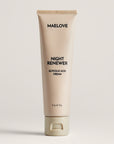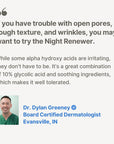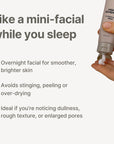




Night Renewer Glycolic Acid Cream
Most orders are processed and shipped within two business days (Mon - Fri excluding holidays). You’ll receive an email with tracking details as soon as yours is on its way.
For US-based shoppers, shipping is on us for orders $50 and over. Anything less is a flat $6.95 charge.
100-Day Peace of Mind: Skincare is a journey, and we're with you. You have a full 100 days to try your products. If you aren't satisfied, returns are free and easy through our self-serve portal or a quick note to team@maelove.com
The great thing about exfoliation is how quickly you see a difference. Many of our customers notice a change after their very first night.
First Night:
- You’ll likely feel a "tingle" upon application. That’s the Glycolic Acid waking up your skin.
- “I have sensitive skin and rosacea and this did not flare it up.” -Nancy C.
First Week:
- You’ll notice your skin feels smoother and looks more "polished" by morning.
- “If your skin looks dull or rough, this stuff quietly fixes it while you sleep.” -Heather M.
Weeks 2–4:
- This is where the "heavy lifting" happens. As the cream consistently sweeps away dead skin cells, you’ll notice a significant reduction in those stubborn "rough patches." Congested pores will also start clearing up.
- “My pores look smaller, and my skin looks more refined and glowy.” -Patricia M.
The long-term effect:
- Regular exfoliation is the key to keeping skin from looking "dull" and dry as we age. By staying consistent, you give your skin the best chance to stay vibrant and youthful for years to come.
- “My skin looks brighter and more even, like I slept better than I did.” -Karen D.
Consistency unlocks the real magic. Use Night Renewer 2–3x a week for best results.


Dermatologists and customers love Night Renewer because it delivers chemical-peel-style benefits in a night cream format:
THE RESURFACER (10% Glycolic Acid)
- The superstar AHA that unglues dead skin cells and sweeps them away.
- It clears clogged pores, smooths rough texture, and signals your skin to make fresh, new collagen for a firmer look.
SOOTHING BOTANICAL BLEND (Arnica, Aloe, Mugwort)
- Think of this as the "fire extinguisher." It calms the skin on contact, neutralizing redness and irritation so you get all the gain without the pain.
MOISTURIZING TRIO (Squalane, Shea Butter, Hyaluronic Acid)
- Restores hydration immediately.
- Squalane mimics your skin's natural oils to moisturize without clogging pores, while Hyaluronic Acid pulls water deep into the skin to plump fine lines.
This combination makes it better for sensitive skin than many “acid toners” or aggressive peels.
Within the first week you’d notice rough patches starting to feel softer and more even. Over time and with consistent use, that turns into more even tone, refined pores, smoother fine lines.
At night, apply a thin layer of Night Renewer on your face, neck, and chest. Massage in until fully absorbed.
Good to know:
- Start slow – use 2-3 nights a week to start.
- Glycolic Acid is a small molecule that works fast. So, Night Renewer may cause a slight tingling sensation initially, which is normal.
- If you’re also using retinoids (such as our popular Moonlight Retinal), most dermatologists recommend alternating: glycolic on some nights, retinoids on others.
- If your skin is very dry, then you might want to apply a gentle moisturizer (such as our Hydro Relief) afterward to add to hydration.
- Leftover cream on your hands? Rub it into the backs of your hands or arms to smooth rough patches. "I use this on my chest, arms, and hands... my arms are the smoothest they have ever been!" – Dr.Hanna Slutsky, dermatologist
- If you’re very sensitive, patch test first (apply inside of your elbow overnight) before using on your face. That easy test reduces your chance of irritation by 95% from our experiences.
See our How to Layer guide for tips on layering multiple Maelove products.
Customer Reviews


For the Curious
All Maelove products are safety-tested for sensitive skin, made in the US, vegan, cruelty-free, non-comedogenic, gluten-free, and free of parabens, phthalates, dyes, and artificial fragrances. We don't use ingredients that are banned in the EU or in the USA.
Water (Aqua), Glycolic Acid, Cyclopentasiloxane, C12-15 Alkyl Benzoate, Cetearyl Alcohol, Glyceryl Stearate, PEG-100 Stearate, Glycerin, Squalane, Butyrospermum Parkii (Shea) Butter, Cetearyl Glucoside, Dimethicone, Polyacrylamide, Aloe Barbadensis Leaf Juice, Dimethylmethoxy Chromanyl Palmitate, Arnica Montana Flower Extract, C13-14 Isoparaffin, Sodium Hyaluronate, Phenoxyethanol, Caprylyl Glycol, Ethylhexylglycerin, Hexylene Glycol, Laureth-7, Ammonium Hydroxide, Xanthan Gum, Disodium EDTA, Tocopheryl Acetate, Tocopherol
Complete skin (epidermal) renewal occurs approximately every 28 days in young adults, while the same process takes 40 to 60 days in older people. This accumulated layer of dead skin makes the skin look rougher and the pores look more enlarged. Light reflecting on the skin also reveals a dull surface (Rodan et al. 2016). By chemically exfoliating these dead cells with hydroxy acids, one can immediately reveal smoother, brighter, and younger looking skin. Regular sloughing off of dead skin cells can also encourage faster turnover of the underlying skin cells, which again mimics the renewal process in younger skin (Kornhauser et al. 2010).
A 10% concentration of glycolic acid is the upper allowable limit for cosmetic products as regulated by the FDA. At this concentration, glycolic acid creams can be safely used and with good tolerability (Abels et al. 2011). Further, at this concentration, glycolic acid creams can be used daily, and will serve as a powerful chemical exfoliant which will improve skin texture, the appearance of lines and wrinkles. and fade hyperpigmentation over a long time. This is because the increased cell turnover will help slough off hyperpigmented skin and rapidly disperse existing pigment which helps to fade the appearance of hyperpigmentation (Kornhauser et al. 2012). Hence, a glycolic acid cream is a helpful adjunct to use along with serums that treat hyperpigmentation by quickening the process by which hyperpigmented spots are sloughed off.
Those looking for a quicker fix will often opt for a chemical peel which also may use glycolic acid but at a much higher concentrations of up to 40%. However, these quicker fixes which should only be done 1 or 2 times annually, chew through living tissue as well as dead skin cells, and so while they may be able to fade deep pigmentation and remove deep imperfections in the skin, they also may lead to scarring and require a longer healing time (Arif 2015, Chilicka et al. 2020, Garg et al. 2009, Sharad 2018).
In addition to exfoliation, high potency glycolic acid can have other benefits as well. Though not typically thought of as a collagen booster, glycolic acid can activate underlying cellular processes that accelerate collagen synthesis by fibroblasts, and modulate matrix degradation through keratinocyte released cytokines (Okano et al. 2003). This collagen building ability was found to increase with increasing concentrations of glycolic acid all while avoiding triggering inflammation when kept at a pH of 4 or higher (Narda et al. 2020). In sun-damaged skin, glycolic acid was found to increase hyaluronic acid content in the epidermis and dermis as well as increasing collagen synthesis and epidermal thickness (Bernstein et al. 2001). In other words, glycolic acid creams are a helpful adjunct to use along with other more powerful anti-aging ingredients such as retinoids to aid in the collagen building process.
Next, glycolic acid creams can maintain the acidic pH level of the skin by supporting the acid mantle which in turn has a wide range of benefits. The skin surface and stratum corneum have a naturally acidic pH between 4.1 and 5.8 and this acidity (also referred to as “acid mantle”) is essential for maintaining the health of the skin (Lukic et al. 2021). Enzymes that build ceramides and other lipids in the skin barrier function best at a pH below 5, while increased pH activates serine proteases that degrade the skin barrier (Hachem et al. 2010). An acidic skin pH is necessary for a functioning skin barrier, which keeps bad bacteria like P. acnes out and keeps moisture in. By supporting the acid mantle, hydroxy acid creams have been shown to kill P. acnes bacteria, and increase skin moisture and strengthen the skin barrier (Valle-Gonzalez et al. 2020, Hachem et al. 2010, Rawlings et al 1996). Along with its exfoliative properties, supporting the acid mantle is one way in which high potency glycolic acid creams treat mild acne even when used alone as a monotherapy (Abels et al. 2011).
Since glycolic acid creams will increase the sun sensitivity of the skin (Kaidbey et al. 2003), this product should be used only at night, and paired with a broad-spectrum sunscreen with an SPF of at least 30 during the day. High potency glycolic acid creams may also be irritating, particularly for those with sensitive skin. A supporting cast of squalane, shea butter, arnica flower, aloe, glycerin, and hyaluronic acid allows this high strength product to simultaneously hydrate, soothe and further soften and moisturize skin making it easier to tolerate for those with sensitive skin. However, for those with very sensitive skin, a lower potency hydroxy acid serum with skin smoothing peptides such as the Super Smooth serum is a better option.
Yes. Glycolic acid and other alpha hydroxy acids (AHAs) such as lactic acid have been tested in animals and showed no teratogenic effects (Chien et al. 2016, Putra et al. 2022). Glycolic acid and lactic acid are only absorbed through the skin and into the bloodstream in negligible amounts and is considered safe in pregnancy at the levels used in over the counter products (Bozzo et al. 2011, Putra et al. 2022). The moisturizing ingredients are all considered generally safe to use topically during pregnancy and lactation. However, it is always advisable to check with your doctor regarding skin care products and ingredients.
Abels C, Kaszuba A, Michalak I, Werdier D, Knie U, Kaszuba A (2011). “A 10% glycolic acid containing oil-in-water emulsion improves mild acne: a randomized double-blind placebo-controlled trial.” J Cosmet Dermatol 10(3): 202-209.
Arif T (2015). “Salicylic acid as a peeling agent: a comprehensive review.” Clinical, Cosmetic and Investigational Dermatology 8:455-461.
Chilicka K, Rogowska AM, Szygula R, Taradaj J (2020). “Examining Quality of Life after Treatment with Azelaic and Pyruvic Acid Peels in Women with Acne Vulgaris.” Clinical, Cosmetic and Investigational Dermatology 13:469-477
Garg VK, Sinha S, Sarkar R (2008). “Glycolic Acid Peels Versus Salicylic-Mandelic Acid Peels in Active Acne Vulgaris and Post-Acne Scarring and Hyperpigmentation: A Comparative Study.” Dermatol Surg 35:59-65.
Kornhauser A, Coelho SG, Hearing VJ (2012). “Effects of Cosmetic Formulations Containing Hydroxy acids on Sun-Exposed Skin: Current Applications and Future Developments.” Dermatology Research and Practice. Doi: 10.1155/2012/710893.
Sharad J (2013). “Glycolic acid peel therapy – a current review.” Clinical, Cosmetic and Investigational Dermatology 6:281-288.
Abels C, Kaszuba A, Michalak I, Werdier D, Knie U, Kaszuba A (2011). “A 10% glycolic acid containing oil-in-water emulsion improves mild acne: a randomized double-blind placebo-controlled trial.” J Cosmet Dermatol 10(3): 202-209.
Bernstein EF, Lee J, Brown DB, Yu R, van SE (2001). “Glycolic acid treatment increases type I collagen mRNA and hyaluronic acid content of human skin.” Dermatol Surg 27(5): 429–433.
Hachem JP, Roelandt T, Schurer N, Pu X, Fluhr J, Giddelo C, Man MQ, Crumrine D, Roseeuw D, Feinhold KR, Mauro T, Elias PM (2010). “Acute Acidification of Stratum Corneum Membrane Domains Using Polyhydroxyl Acids Improves Lipid Processing and Inhibits Degradation of Corneodesmosomes.” Journal of Investigative Dermatology. 130:500-510.
Lukic M, Pantelic I, Savic SD. (2021). “Towards Optimal pH of the Skin and Topical Formulations: From the Current State of the Art to Tailored Products.” Cosmetics 8,69. doi.org/10.3390/cosmetics8030069.
Narda M, Trullas C, Brown A, Piquero-Casals J, Granger C, Fabbrocini G.(2021) “Glycolic acid adjusted to pH 4 stimulates collagen production and epidermal renewal without affecting levels of proinflammatory TNF-alpha in human skin explants.” Journal of Cosmetic Dermatology 20:513-521.
Okano Y, Abe Y, Masaki H, Santhanam U, Ichihashi M, Funasaka Y. “Biological effects of glycolic acid on dermal matrix metabolism mediated by dermal fibroblasts and epidermal keratinocytes.” Exp Dermatol. 2003; 12 Suppl 2: 57–63.
Rawlings AV, Davies A, Carlomusto M, Pillai S, Zhang K, Kosturko R, Verdejo P, Feinberg C, Nguyen L, Chandar P (1996). “Effect of lactic acid isomers on keratinocyte ceramide synthesis, stratum corneum lipid levels and stratum corneum barrier function.” Arch Dermatol Res 288:383–90.
Schreml S, Meier RJ, Albert MG, Seidl U, Zeller V, Behm B, Landthaler M, Abels C, Babilas P (2012). “The Impact of 10% alpha-Hydroxy Acid Emulsion on Skin pH.” Skin Pharmacol Physiol 25(1): 34-38.
Valle-Gonzalez ER, Hackman JA, Yoon BK, Mokrzecka N, Cho NJ (2020). “pH-Dependent Antibacterial Activity of Glycolic Acid: Implications for Anti-Acne Formulations.” Scientific Reports 10:7491.
Kaidbey K, Sutherland B, Bennett P, Wamer WG, Barton C, Dennis D, Kornhauser A (2003). “Topical glycolic acid enhances photodamage by ultraviolet light.” Photodermatology, Photoimmunology & Photomedicine 19(1): 21-27.
Bozzo P, Chua-Gocheco A, Einarson A (2011). “Safety of skin care products during pregnancy.” Canadian Family Physician 57: 665-667.
Chien AL, Rainer B, Sachs DL, Helfrich YR (2016). “Treatment of Acne in Pregnancy.” J Am Board Fam Med. 29: 254-262.
Putra IB, Jusuf NK, Dewi NK (2022). “Skin Changes and Safety Profile of Topical Products During Pregnancy.” J Clin Aesthet Dermatol. 15(2): 49-57.



